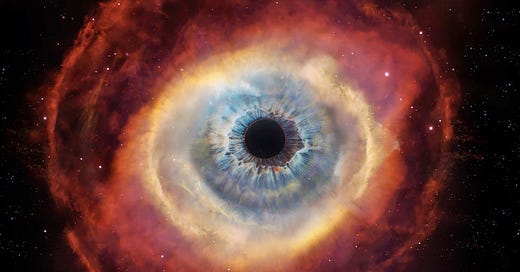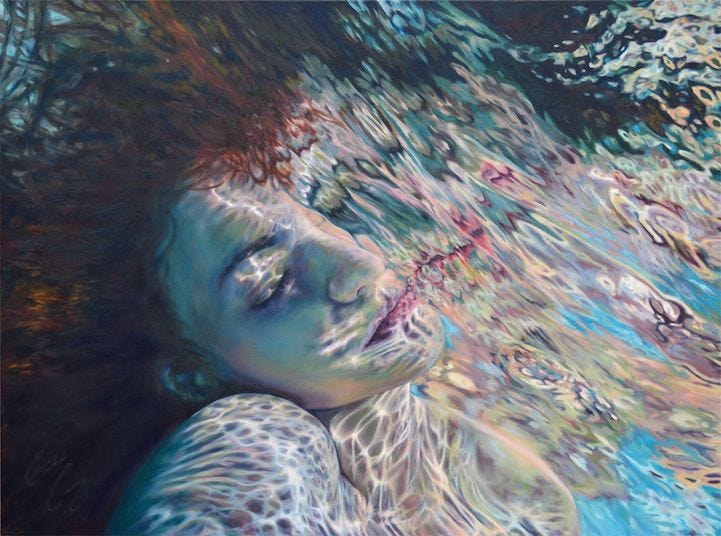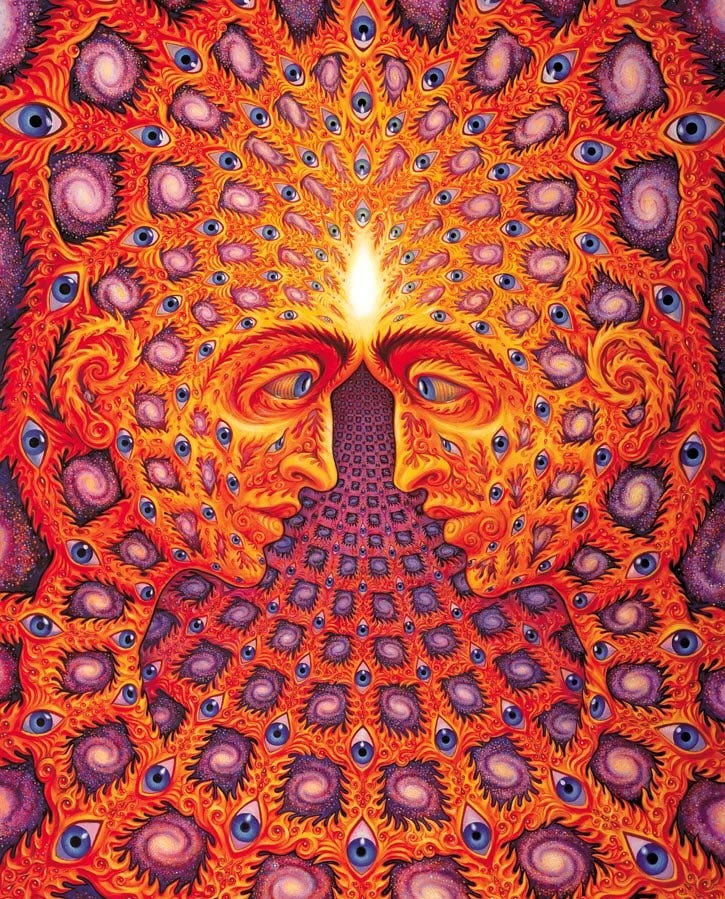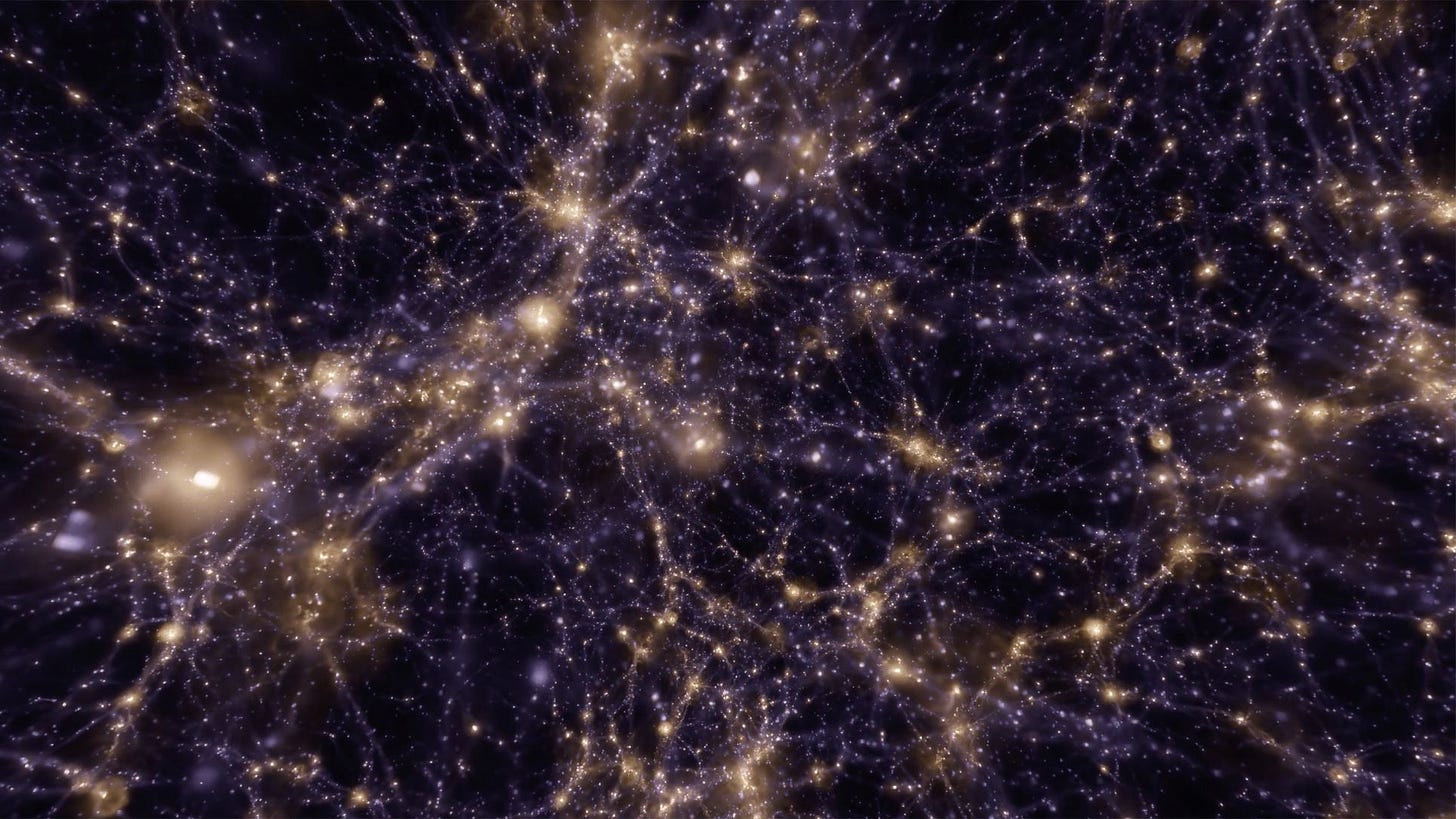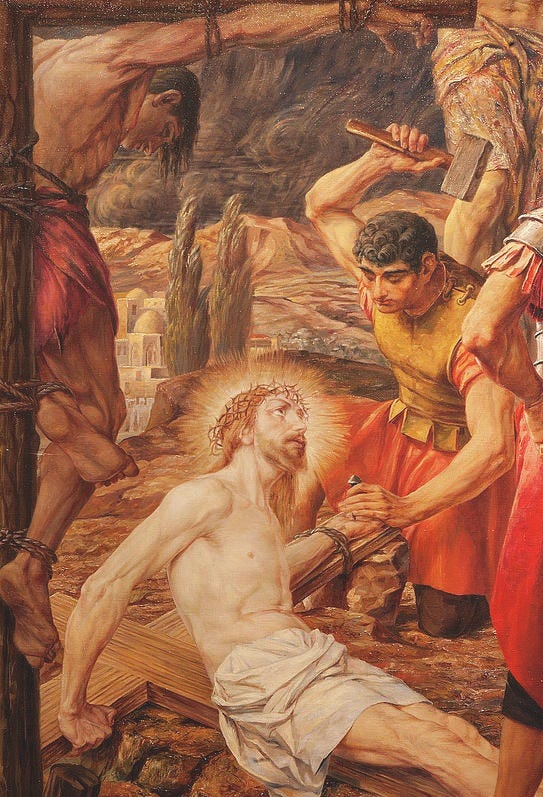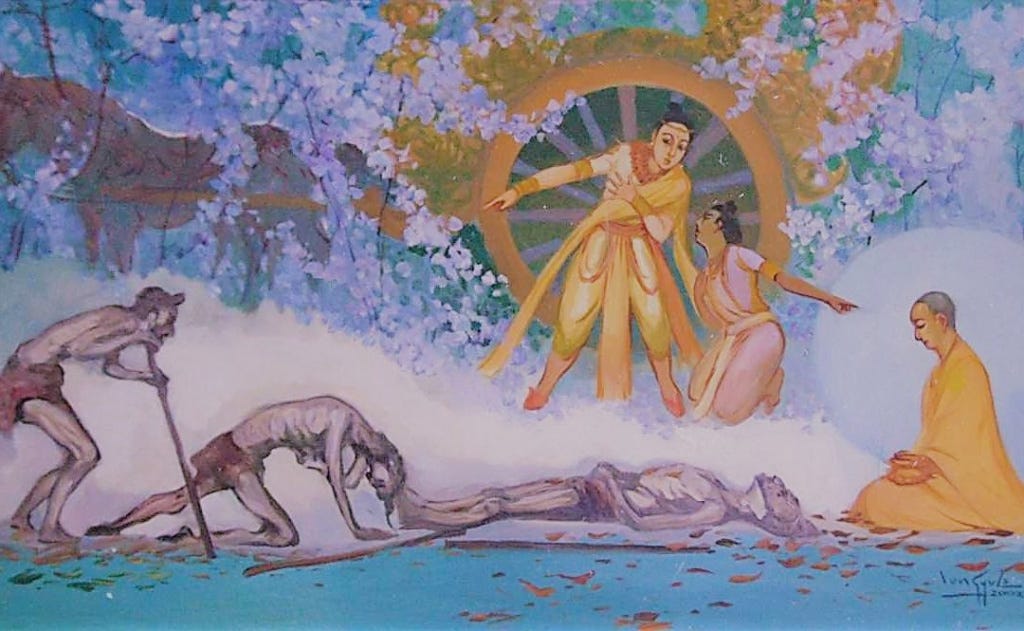Emergentism | Chapter 4: Interpreting the Universe, Part I
The Meaning of the Universe
So, let’s try this again. Why do I exist? Where are we going? What’s it all about?
To answer these questions rightly, let us first add, in addition to our new taxonomy of Matter, Life, Mind, and Culture, a fifth term—the Universe itself, capital U: the greatest Whole in which all of these are but parts, and in whose relentless learning-through-complexification we find something more lifelike and intentional than we might yet have imagined.
We have all heard that the Universe is expanding; this fact is uncontroversial among physicists today. But the Universe is also developing, and this is a bit harder to digest. It is, however, just as factually incontrovertible. The Universe, as a whole, is evolving, elaborating, complexifying—becoming more rich in structure, relationship, and diversity. It is time we stop thinking of the Universe, then, like some big ball that’s just inflating; it is much more accurate to think of it as a living organism that is growing, passing through distinct phases of development, even maturing.
Each new emergent level adds a new layer to this developmental process, changing the Universe in novel and unpredictable ways. There is pattern, but also surprise. There are rules—but also the appearance of new rules, constantly. The story of the Universe’s evolution is not some linear increase, but more like the unfolding of a flower: from seed to sprout to leaves to bloom…
The Greek philosopher Aristotle was the first to systematically study and theorize about such developmental processes in Nature. Considering the acorn and the oak, it was clear that one was the aim of the other—but how did this work?
The word for “aim” in Greek is telos, and teleology was the study of aims in Nature begun all the way back with Aristotle. Though early and rather simplistic philosophies of teleology became deeply problematized by modern science, especially by early conceptions of Darwinian evolution, the breakthrough insights of the new science of complexity have returned the issue of teleology to center stage. It is impossible, it seems, to understand complexity without some theory of aims.
Meaning, we noted, is a whole-part relationship. The score the violist plays only makes sense in the context of the symphony. Purpose, we can say, requires that a part be working for a greater whole. So what does it mean that water molecules self-assemble into a whirlpool in order to dissipate energy? Or that many individual cells come together in order to behave as a more robust, functional organism? The whole so clearly appears the aim for which the parts act—if only in some crude, unconscious way.
And yet, our own sophisticated, highly conscious aims seem to have emerged out of these sorts of lower-order aims. Determinism yields, eventually, to will, with the emergence of Mind—a gain of freedom further amplified in reflective, self-conscious creatures. It is like a beautiful face being freed from the marble slab that concealed it. Or like a goddess rising from the sea. So purpose itself “emerges” from mere matter.
Can we speak, then, about an aim to the Universe as a whole? Towards what is it tending? What blossom awaits from the bud? Science has shown us the door; now we must walk through it.
Yes, the development of the Universal organism shows a clear trajectory towards complexification. Structural complexity, though, is only half the story—the superficial side of a far more profound kind of evolution. Noting that the Universe is becoming more structurally complex is akin to recognizing that computers are being made with more intricate hardware and smaller and smaller chips.
But these design improvements serve an aim—namely, being able to run more powerful software. In the same way, the increasing structural complexity and energy rate density of the Universe’s unfolding designs are just the outer evidence of an inner process: the Universe is becoming more conscious.
With each new emergence and deepening of consciousness, the Universe produces more knowledge. But knowledge about what, exactly?
Well, about the Universe itself!
Set in motion by a fine-tuned cosmos, Matter yielded to Life, by means of which the Universe could encode knowledge about itself through a genetic tongue. This was a huge first step. Billions of cells, all bustling and jostling like countless little microsensors of reality, explored the possibility space of existence and groped their way, from generation to gener-ation, towards greater embodied encoding of the world.
Eventually, these clustering proto-senses organized into elaborate networked nervous systems, and Mind at last emerged. So the Universe deepened towards a plethora of rich interior experiences of itself. The Universe could now see through the eyes of animals, hear its own murmurs and vibrations, feel the matter of the world that before was but code. Pain and pleasure now roared into existence. Emotion welled up from reality. From worms to whales, hummingbirds to hominids, the Universe now cared, willed, valued, and was free to explore itself still further into uncharted territory.
Through its immense new computational power, Mind built up better and better mental models of the physical world. Depth, color, cause, relation—the Universe now came alive to itself in all its complex forms. The nuances of niche were mapped—as well as the intricate social world.
And then: the word. Language. Speaking. Discourse. Humans discovered symbol, and crafted Culture from conceptual introspection. The inner voice turned on, and Reality spoke to itself. It met its Self. It saw it was a Self, and with this revelation woke, at last, from time’s deep sleep into Awareness.
That is what you are.
The product of the Universe’s fourteen-billion-year march forward towards a waking up to greater consciousness leads to your door! As the cosmologist Carl Sagan aptly put it: “We are a way for the cosmos to know itself.” To know its Self is the aim of the Universe. To gain Self-knowledge. To behold its Self for what it is.
That is what it has been striving to do. That is what all of this has been about. That is the telos of existence. The Universe has been awakening from its primordial sleep, its ancient unconscious. Slowly, gradually, across the eons, the tenuous spark of Awareness has been growing, spreading, moving. The subterranean Spirit has been stirring—groping, shifting: learning. That is the goal of humankind—to know the Universe as Self.
γνῶθι σεαυτόν.* तत् त्वम्.** אֶהְיֶה אֲשֶׁר אֶהְיֶה.***
To experience this is to be made whole.
The complexification of the cosmos, then, which the new science has been revealing in all its rich details, is really about the awakening of the cosmos. By “awakening,” I mean not only becoming conscious, such as we experience when we awake from unconscious deep sleep, but also something like enlightenment, such as practitioners of meditation speak of when coming to true Self-knowledge through inner reflection.
Since we are the self-consciousness of the Universe, this awakening occurs through us. We have been participating in the process since our origins, and carrying it forward through the collective deepening of our cognition, knowledge, and worldviews across the centuries. The development of science was itself a huge step forward in this endeavor.
Leaving behind the limited scope of religious traditionalism, we began to know better how the world really works, and the nature of the subjective self. The process was messy, to be sure, and we are still dealing with the nihilism caused by its confusing transition away from the old mythic-traditional mindset. But the advance has born fruit, since we are now presented with an even more profound, sublime, and awe-inspiring Mystery to behold—one that science not only supports, but has pushed us towards.
The Meaning of God
The thing for which humanity strives, its telos, has been called “God” in the religious tradition. That was the word for the greatest Whole conceivable, of which each person found meaning by conceiving themselves a part. As actors in the divine drama, humans felt their activities had meaning and purpose—a sense of meaning that was lost as early science struggled to make sense of the relationship of parts to wholes. Now that we have regained a sense of the whole, while having also developed beyond the limited conception of God in traditional religion, it is time we reclaim our religious sensibility and update our sense of what God, humanity’s telos, really is.
There is a divine drama underway: the Universe’s 14-billion-year journey towards awakening in full Self-knowledge and becoming Whole. God and the Universe are one.
The full realization of this, in which we are participating, is still to come; indeed, that is why we participate—there is still so much more to do. But the idealized aim of its realization, involving the emergence of a Cosmic Consciousness of the deepest imaginable care, beauty, power, and knowledge—that is the God emerging.
As idea or ideal of any kind, the notion of “God” only emerges in the Universe with the emergence of symbolic Culture and self-consciousness. What in primitive cells may have been perceived as urge, and in minded animals as will, becomes, at the level of symbol and self-consciousness, a truly spiritual aspiration. But, like teleological aims at all the prior levels, such a God is always evolving. The idea shifts, develops, grows. So “God” complexifies with the evolution of more complex justification systems and worldviews. Through the dialectic of the metamemes, God deepens.
In this way, across the millennia of human Culture, God has evolved through animistic forces in tribal societies, pantheons of empires, the celestial king of traditional societies, the immutable laws of nature in modern ones, and the queering of spirit in postmodernity, to appear to us now in the guise of the very Self evolving with the Universe towards transcendence. All such transformations and metamorphoses are steps on the way towards God’s awakening, as each stage reveals deeper truths about God and pushes the dialectic forward.
By our awakening to the idea that God is awakening, God is awakening, because we are God’s self-consciousness. By awakening to the realization that we are God, we come to enlightenment—and so does God. The deepening of consciousness caused by complexification is a deepening of subjectivity’s ability to recognize the objective Universe. When that subjectivity recognizes itself as the objective Universe, the Universe is united with itself. The Self becomes whole, because the Self is all.
Towards this mystical union, God is evolving, and we are evolving God—via the symbolic evolution of Culture. In this way, the reconceptualization of God is a means to the enlightenment of God and ourselves. Doing this means freeing God from the stone of old, ossified symbols and structures by continually, creatively re-imagining God.
To learn better what God is, and thus to help God learn God’s Self better, demands the same sort of trial and error, exploration, novelty, and “active inference” which produces all knowledge—from Life’s variation and selective retention, to Mind’s experimental learning, to Culture’s scientific enterprise of hypothesis testing. Building on designs that have worked, new designs must be tested and tried, such as might work better in a new environmental context. Today, the old medieval world that produced our traditional God concept is gone. God enters a metamodern age, between worlds, between identities. God’s awakening to Self-knowledge, and our own enlightenment (which are the same), thus require that we continue re-imagining God with new symbolic expression. We must reinvent religion.
The awakening of the Universe and the transformation of an ever-more-realized God is ceaselessly ongoing. Indeed, it seems best to conceive of this process as having no ultimate limit or final state—even if it does have an ‘event horizon’ that defines it. “Deity,” wrote Alexander, “is nisus and not an accomplishment.” God is infinite because God is infinitely becoming God more and more. God is the singularity of complexity, the asymptote on the graph of exponential complexification.
The “Omega Point” of Universal awakening is not a point per se, then, but the infinitely vanishing coordinate where the line of history converges towards the point of Being—an event horizon beyond which Divinity is simply endlessly more of itself, more endlessly knowledgeable and known.
In the course of this unfolding, “God” begins to emerge more fully in reality. (You might even call it “incarnation,” the conceptual Logos made flesh. But more on that later.) The God of Emergentism is a naturalistic God—the apex of the pyramid of enriched reality being made of the same stuff as the rest of Nature. In this way, immanence itself is made the locus of transcendence. Participating in the divine drama of God’s awakening transubstantiates the world.
Humans have a unique role to play in this process, given our unique occupation of the emergent level of Culture on this planet (something we will speak more about in the next chapter).
However, we are very likely not alone in this. The new science has revealed how the Universe is primed for, geared for, set up for the emergence of Life, Mind, and Culture. Given its fine-tuned laws and isotropic nature, the same mechanisms that led inexorably to the complexification of matter on Earth are occurring all throughout the Universe. The cosmos is a vast open system, wherein free energy is always flowing, organizing the matter it flows through. By the basic laws of thermodynamics, dissipative adaptation builds on dissipative adaption, leading to a great mandala of emergences. The Universe wants to wake up.
Whereas once scientists considered life a statistical fluke and “happy accident,” today it is seen as just the opposite: a likely occurrence, and bound to happen where conditions allow. Given the sheer scope of the Universe, that probably means all over the place.
Based on astronomical data, astrophysicists estimate that there may be anywhere from 300 million to over 40 billion Earth-like planets—in our Milky Way galaxy alone! The whole Universe, meanwhile, is estimated to consist of hundreds of billions, if not trillions, of galaxies, all networked together in a great Cosmic Web…
Chances are, we are not the only ones serving as the self-conscious embodiments of the Universe. There are more gods in the heavens than us. The sky is full of them, and we are all a way for the cosmos to know itself. Every galaxy and galaxy cluster is not just dead gas and exploding plasma, but its own organelle in the Universal organism, teeming with consciousness: filaments in the mind of God. The Universal Consciousness may already exist, comprised of the billions of self-conscious minds throughout the galaxies.
God has awakened across the heavens.
The Meaning of Suffering
The vision of God we have been considering is, I believe, beautiful and profound. It is, however, admittedly somewhat different from how many people tend to think of God. Isn’t God supposed to be “all-knowing” (omniscient), “all-powerful” (omnipotent), and “all-loving” (omni-benevolent)? The God of Emergentism would seem to be only becoming such things. Is this God-concept really worthy of the name, then? Doesn’t thinking of God like this create too many problems?
As it happens, thinking of God like this resolves many of the problems that have plagued religious thinking for millennia—particularly the thorniest challenge of all: the problem of evil and suffering.
If we are to maintain that God is truly omniscient, omnipotent, and omnibenevolent, and always has been and always will be, then how do we explain the unspeakable amount of pain and suffering in the world? If God made everything just as it is, knowing it would include all the mass extinctions, tortures, famines, plagues, genocides, rapes and molestations that have occurred and continue to occur—even though he could have made it all differently—then we can only conclude that such a God is evil.
Even if we counter (as theologians have across the millennia) that such things only occur because God gave humans free will, it still does not resolve the problem. Much of the suffering in the world is from natural disasters, the basic fact of mortality, and systemic oppression—forms of suffering outside the ken of individual free will. In any event, if God were truly all-powerful, God could create free will such that it never produced any suffering (a thought which might seem paradoxical to us, but only because we live in a world where free will exists as it does—the suffering-dependent free will that God inexplicably chose to create). In short, considering the nature of the world we live in, if there were a God responsible for it all, that God could be all-loving or all-powerful—but not both.
The idea that God is supposed to be both is a paradox which, failing to be resolved according to any rational notion, can only be embraced by asserting faithful cliches like “God works in mysterious ways” or “God’s ways are not our ways.” But try telling this to the man who lost his wife and children in a house fire, or the girl chained up in a man’s basement for decades as a sex slave. If you do not feel the aching inadequacy of such a rationalizing response to these horrors, your desire for existential comfort through theological platitudes has clearly blinded you to your own humanity.
Suffering is real. And would any God worth the name have knowingly chosen it, had such a God power to do otherwise? According to the theology of Emergentism, God didn’t, and couldn’t. The Universe may be headed towards infinite Love, Compassion, Knowledge and Power, but it started off as mere radiation, spent billions of years as bacteria, and only gradually worked its way up to beings with any degree of awareness, let alone self-consciousness and a moral compass.
God is not conscious enough in the lion to understand or amend the suffering of the elk. Graciously, the elk is not conscious enough to fully contemplate its own suffering, which would render it truly excruciating. The degree of consciousness renders suffering more acute, but also more amenable to alleviation.
Only at the level of self-consciousness do morality and ethics emerge. Only once the Universe has come, via will, and then concepts (including counterfactuals), to self-awareness, can it choose to diminish suffering. Only then is it capable of doing so, and only then is it responsible to do so.
Tennyson asked, “Are God and Nature then at strife, / That Nature lends such evil dreams?” In a way, Yes. Nature is not yet God; God is the future’s infinitely perfected Nature. After the Big Bang, but before apotheosis, Nature lacks the omniscience and omnipotence we attribute to its telos, God. On the other hand, because Nature tends towards God, and is God fundamentally (albeit in embryonic form), God is no more at strife with Nature than an adult is at strife with herself as a child. But we do not hold the child to the same standards as the adult. The child is still undeveloped. Progress requires imperfection.
Accepting this view of things, suffering does not refute God, but only one conception of God (namely, as unchanging, omniscient, and omnibenevolent). Allowing for the changingness of God, for God’s evolution, resolves the paradox of suffering and divinity.
Moreover, seeing that it is through self-conscious agents like us that God becomes aware, we lose the illusion that God is some perfect figure acting upon us from above, subjecting us to suffering, allowing terrors to occur, and so on. Instead, it is through the eyes of the world that God sees. God is the man who lost his family; God is the tortured girl. God does not escape suffering. God suffers because humanity suffers. Suffering humanity is God—torturer and tortured, crucified and crucifier. God is always on the cross; God is always the soldier who nailed him to it, too.
The degree to which God aims to reduce suffering is tied to the depth of consciousness that allows for the recognition of suffering and the capacity to take responsibility for its alleviation.
Such a depth of consciousness has appeared in this corner of the Universe only fairly recently. As Culture evolves (and God with it), one should expect to see greater sensitivity to suffering, and greater concerted effort to alleviate it. And, indeed, something like this is precisely what is occurring—not, to be sure, as any simple, linear trajectory towards Utopia (as some of the more optimistic modernists imagined), but it is happening, naturally and unavoidably, in fits and starts, like any developmental process.
There is, then, a direct connection between the increase in knowledge (broadly conceived) and the reduction of suffering. Nor should this be surprising, since wisdom has always been conceived as being won only at great cost. But it does put an ethical spin on the complexification narrative we have been considering. Complexity deepens consciousness, rendering the Universe more sensitive to its own suffering, more knowledgeable of its imperfections, as well as more able to attempt resolving them. The Universe’s march towards greater and greater Self-knowledge, then, is a march towards goodness. A march towards redemption. Life is suffering, said the Buddha. Awakening to true Self-knowledge leads to the alleviation of that suffering; the Universe’s enlightenment brings liberation. In Christian terms, the Incarnation brings salvation.
Senseless though much suffering is, then, there is also a way in which its experience teaches self-consciousness more about reality as it is, how its mental map remains incomplete, what causal power it still lacks, and what might yet be done to improve it all. Through suffering, consciousness updates and, ideally, improves. God evolves through suffering. In this sense, suffering itself can be redemptive to the degree it moves God forward.
In his magnum opus of psychology, The Varieties of Religious Experience, William James quotes many first-hand accounts of reported spiritual rapture, ecstasy, and mystical union. One evocative account speaks to the theopoetic redemption of suffering we have been considering, articulated in powerful mythic imagery. In this account, a woman relates her vision (which today we might call an entheogenic or psychedelic experience) that is worth quoting in full. “A great Being or Power was traveling through the sky,” she recounted of her ether trip,
his foot was on a kind of lightning as a wheel is on a rail, it was his pathway. The lightning was made entirely of the spirits of innumerable people close to one another, and I was one of them. He moved in a straight line, and each part of the streak or flash came into its short conscious existence only that he might travel. I seemed to be directly under the foot of God, and I thought he was grinding his own life up out of my pain.
Then I saw that what he had been trying with all his might to do was to change his course, to bend the line of lightning to which he was tied, in the direction in which he wanted to go. I felt my flexibility and helplessness, and knew that he would succeed. He bended me, turning his corner by means of my hurt, hurting me more than I had ever been hurt in my life, and at the acutest point of this, as he passed, I saw. I understood for a moment things that I have now forgotten, things that no one could remember while retaining sanity. The angle was an obtuse angle, and I remember thinking as I woke that had he made it a right or acute angle, I should have both suffered and ‘seen’ still more, and should probably have died.
He went on and I came to. In that moment the whole of my life passed before me, including each little meaningless piece of distress, and I understood them. This was what it had all meant, this was the piece of work it had all been contributing to do. I did not see God's purpose, I only saw his intentness and his entire relentlessness towards his means. He thought no more of me than a man thinks of hurting a cork when he is opening wine, or hurting a cartridge when he is firing. And yet, on waking, my first feeling was, and it came with tears, ‘Domine non sum digna’ [Lord, I am not worthy], for I had been lifted into a position for which I was too small. I realized that in that half hour under ether I had served God more distinctly and purely than I had ever done in my life before, or than I am capable of desiring to do. I was the means of his achieving and revealing something, I know not what or to whom, and that, to the exact extent of my capacity for suffering.
While regaining consciousness, I wondered why, since I had gone so deep, I had seen nothing of what the saints call the love of God, nothing but his relentlessness. And then I heard an answer, which I could only just catch, saying, ‘Knowledge and Love are One, and the mea-sure is suffering.’
Each individual consciousness is a vehicle for God’s evolution. But updating the algorithm of God is no dry, mechanical affair; it takes struggle, sweat, and tears. We are building a cathedral; we are slogging stones through the desert, forging pyramids; we are re-designing civilization. “God offers to every mind its choice between truth and repose. Take which you please—you can never have both.” By choosing truth, the mind makes its own offering to God.
To be fair, this is only in the best of circumstances. Much suffering is meaningless, the consequence of a world in which God is not yet, but on the way. Laboring towards its alleviation hastens the coming of God into the world. Suffering for the alleviation of suffering is sacrifice. At the same time, it is an aim for human endeavors, and thus the source of meaning. And toiling in the divine labor is the most meaningful effort of all.
NEXT: Hermeneutics: Interpreting the Universe, Part II
* “Know thyself” – inscription above the entrance to the Delphic oracle.
** “Thou art that” – one of the “Great Sayings” of the Upanishads.
*** “I am that I am” – the identity of God revealed to Moses.
(Notes for this chapter can be read online at https://www.brendangrahamdempsey.com/emergentism-notes)
Buy the full book here:

